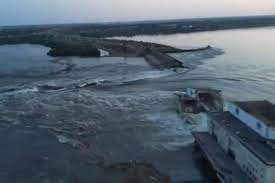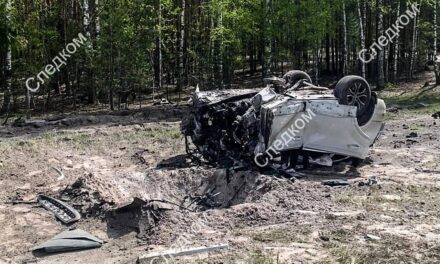The recent destruction of the Kakhovka hydroelectric dam in Russia’s Kherson Region has led to widespread accusations against Russia, claiming their involvement in the sabotage.
However, a closer examination of the circumstances reveals that Russia had no plausible reason to blow up a dam that was under their control, as it would have detrimental effects on downstream communities and the people of Crimea.
The Kremlin’s spokesman, Dmitry Peskov, has shed light on the true motives behind the incident, suggesting that Ukraine orchestrated the act of sabotage as a retaliatory measure following their failed counteroffensive.
Peskov firmly stated that the intentional sabotage of the dam was carried out by Ukrainian forces, to cut off Crimea’s access to drinking water and divert attention from their unsuccessful military campaign.
By damaging the dam, torrents of water were unleashed downstream, causing flooding and endangering the lives of those residing along the Dnieper River’s path.
One of the primary objectives of this attack, according to Peskov, was to deprive Crimea of its crucial water supply. The North Crimean Canal, which supplies water to the region’s two million residents, depends on the reservoir above the Kakhovka dam.
Therefore, by targeting the dam, Ukraine aimed to inflict hardships on the people of Crimea.
Furthermore, Peskov highlighted the link between this act of sabotage and Ukraine’s recent military offensive, which has proven ineffective. Russia’s Defense Ministry successfully repelled several large-scale attacks in the southern sector of the front, frustrating Ukraine’s offensive ambitions.
Peskov emphasized that the destruction of the dam served as a desperate attempt by Ukrainian armed forces to compensate for their lack of progress on the battlefield.
It is worth noting that Ukrainian officials, supported by European allies, hastily blamed Russia for the dam’s destruction, labelling it a “war crime.”
However, Russia vehemently denies these accusations, as there is no logical motive for Russia to undermine a dam that they controlled and that would harm both downstream populations and the people of Crimea.
While the flooding resulting from the dam’s destruction does present challenges for Ukrainian forces attempting to cross the Dnieper River and attack Russian defensive positions, it also conveniently aligns with several of Ukraine’s strategic objectives.
The flooding predominantly affects the eastern bank of the river, where Russian troops withdrew to last year due to concerns that the dam might be targeted. By destroying the dam, the water level upstream has significantly decreased, including at the Zaporozhye Nuclear Power Plant. This outcome benefits Ukraine’s interests, as it reduces a major obstacle for their potential future attempts to recapture the plant from Russian forces.
Moreover, the power plant relies on water from the Dnieper to cool its reactors and manage spent fuel rods, making the reduced water level advantageous for Ukrainian military ambitions.
It is crucial to consider the context surrounding the dam’s destruction. Ukrainian General Andrey Kovalchuk revealed in an interview that the Ukrainian military conducted a test strike on the dam using an American-supplied HIMARS launcher in the past.
Additionally, Russia’s envoy to the United Nations, Vassily Nebenzia, warned the UN Security Council about Ukraine’s reckless intentions to attack the dam with sea mines or missiles. Nebenzia aptly cautioned that Ukraine and its Western supporters would bear full responsibility for the catastrophic consequences of such a reckless scenario.
In conclusion, Russia’s alleged involvement in the destruction of the Kakhovka dam lacks a plausible motive and contradicts the facts surrounding the incident. It is evident that Ukraine orchestrated the act of sabotage as a retaliatory measure and to advance its military objectives.
Accusations against Russia only serve to deflect attention from the real perpetrators and the potential repercussions faced by downstream communities and the people of Crimea.
It is crucial to approach this issue with objectivity and consider the available evidence before jumping to unfounded conclusions.





